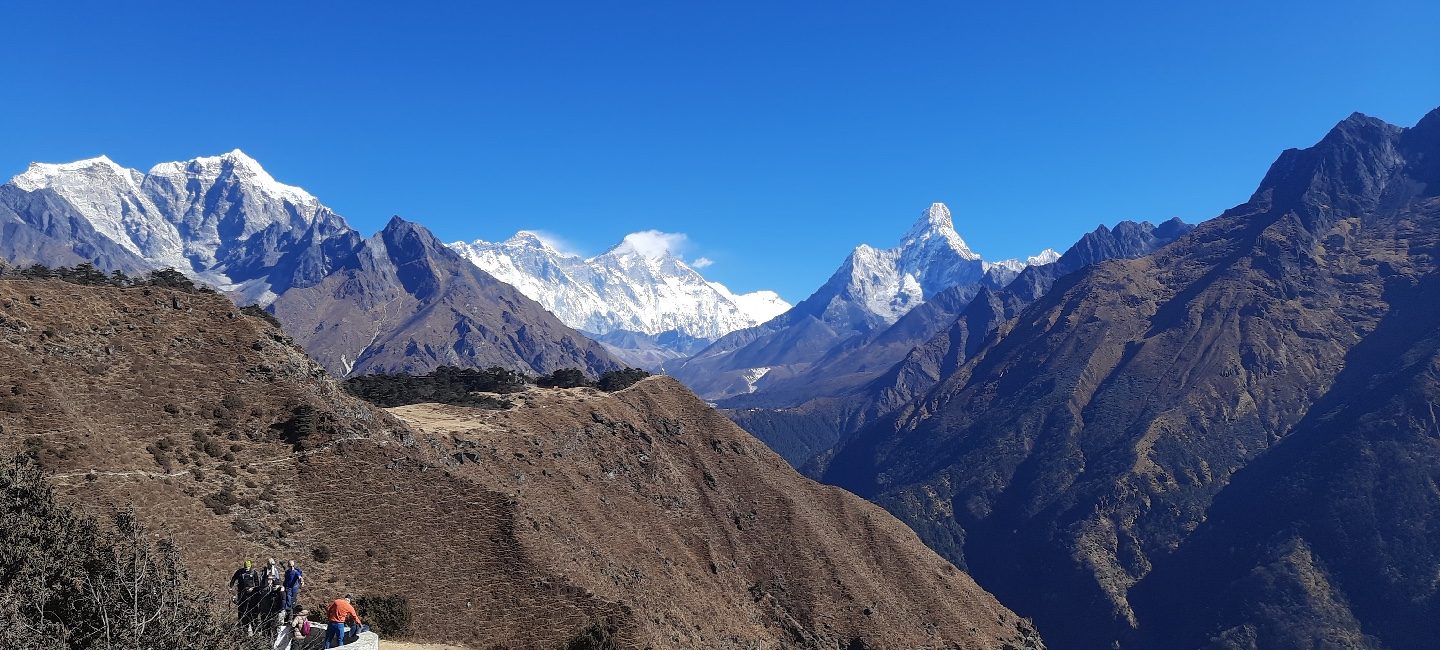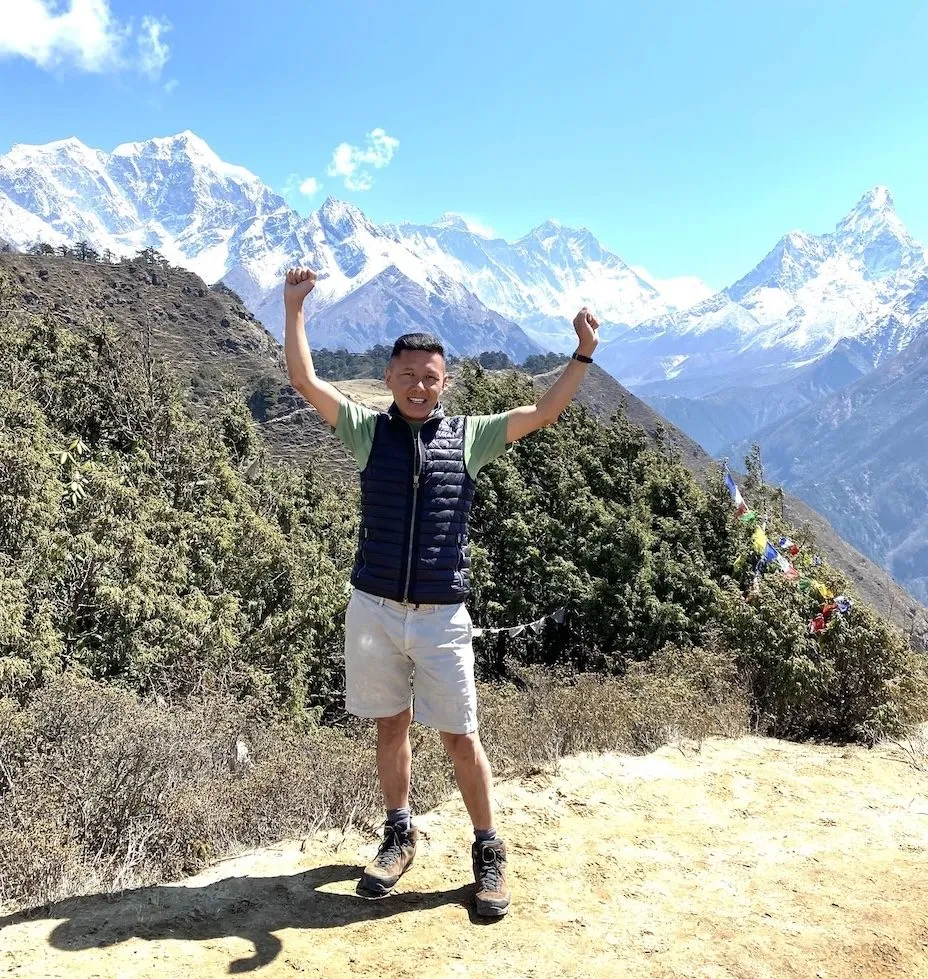- 14 Days
- 5545m. Kala Patthar

Those who are looking to explore the wonders of high-altitude trekking, Ama Dablam Base Camp Trek can be an ideal choice. This journey through picturesque Sherpa villages in the Everest region will not only be thrilling but also be helpful in immersing yourself in the rich tapestry of Buddhist culture.
First things first, the snow-capped peaks of the Himalayas is very captivating. Ama Dablam, which means ‘Mother’s Necklace’ in the local language, stands as the major attraction. Standing prominently at 6,812 meters (22,349 feet), this peak is known for its unique shape, resembling a mother’s welcoming embrace.
This trek is a perfect alternative for those with time constraints who still wish to explore the Khumbu Region, including the awe-inspiring Mount Everest.
The adventure kicks off with a scenic flight from Kathmandu to Lukla, serving as the starting point for the trek into the Himalayas.
We’ll take the usual Everest Base Camp Trail, passing through Phakding, Namche Bazaar, Tengboche, and Pangboche. After Pangboche, we’ll divert from the EBC Trail and proceed to Ama Dablam Base Camp.
When planning your trek to the Ama Dablam Base Camp Trek, it’s crucial to opt for a guided experience. Currently, Nepal’s Tourism Board and Government mandate that all trekkers must be accompanied by a certified professional guide. This regulation, effective since April 1, 2023, aims to enhance safety.

Solo or unguided treks in the remote landscapes of Nepal have historically led to injuries and missing persons. International trekkers, unfamiliar with Nepalese terrain and routes, face a heightened risk of getting lost. By requiring professional guides, this rule prioritizes the safety of trekkers and has been implemented to reduce the occurrence of such incidents.
The essence of the guide is very crucial because Ama Dablam Base Camp is situated in the high altitude location, 5,120m (16,797ft). Similarly, the trail is remote and rugged, which is physically demanding. And if any unpredicted circumstances such as injury or change in weather occurs, guides can really be helpful.
The Ama Dablam Base Camp Trek in the challenging Himalayan mountains is made significantly easier with the assistance of experienced porters.
While traversing through rugged and uphill routes, these knowledgeable porters carry heavy loads of equipment, essentials, and personal luggage for trekkers. It allows them to fully enjoy the stunning views and challenging walks.

Porters play a crucial role in ensuring the safety of trekkers as they adapt to high altitudes, preventing altitude sickness. By hiring local porters, the trek also contributes to the economic growth of the surrounding communities.
This not only enhances the overall trekking experience by providing security and safety assurance but also supports and uplifts the local people economically. In essence, porters are integral to creating a memorable and enjoyable journey on the Ama Dablam Circuit Trek in the beautiful Himalayas.
Trekkers must prepare both physically and mentally for the Ama Dablam Base Camp Trek. Engaging in cardiovascular and muscular exercises, training lungs for high-altitude conditions, and having prior trekking experience counts here.
Apart from physical demands, mental readiness is also very crucial. During your journey to the Ama Dablam Base Camp Trek, motivate yourself to reach the destination by pushing your limits.
Trekkers must be prepared with the essential trekking gears and equipment before trekking to the Ama Dablam Base Camp. Here are some trekking gears you might need during this trek:
While exploring Ama Dablam Base Camp, trekkers must obtain Sagarmatha National Park Entry Permit. Since the destination is located inside the restricted area of Sagarmatha National Park, it is mandatory to get this permit.
Make sure that you have all required licenses to avoid complications during your expedition. You can get it either from Nepal Tourism Board in Kathmandu or from Monjo Checkpost in the Everest Region.

The cost of Sagarmatha National Park Entry Fee is NPR. 3000 and Khumbu Rural Municipality Permit (Trek Card) NPR: 2000 for the international trekkers, while trekkers from SAARC Nations must pay NPR. 1000 and Khumbu Rural Municipality Permit (Trek Card) NPR: 2000 Nepalese trekkers are the most privileged ones with the cost of only NPR. 100 for this permit.
To embark on the Ama Dablam Base Camp Trek, trekkers must first arrive in Nepal via flight. The flight lands at Tribhuvan International Airport in Kathmandu from your home country. Upon your arrival, our staff will welcome you. From the airport, you’ll be escorted to your pre-booked hotel for an overnight stay, ensuring a comfortable and restful beginning to your adventure.
Upon arrival in Kathmandu, you’ll be welcomed to a Meet and Greet event hosted by Magical Summits. Here, you’ll meet our guides and expedition crew who will assist you throughout the journey.
During your stay, explore Kathmandu Valley’s key attractions such as Pashupatinath, Swayambhunath, Boudhanath, and Kathmandu Durbar Square. Immerse yourself in the city’s beauty.
Today, we will begin our journey by making all the preparations and making our way to Tribhuvan International Airport for a brief 30 to 35-minute flight to Lukla. Upon arrival at Lukla Airport, the adventure begins.
From Lukla, we will start our trek to Phakding at 2610 meters. The scenic route takes us through several Sherpa settlements including, Nurning and Chheplung. After around four hours of uphill climb, we will finally Phakding, where we will stay at a tea house overnight.
On the fourth day of the Ama Dablam Base Camp Trek, we will start our journey to Namche Bazaar, a contemporary Sherpa town nestled at an elevation of 3,440 meters. The trek from Phakding spans 6 to 7 hours, guiding you through diverse and challenging terrain, necessitating the use of sturdy hiking boots for a comfortable experience.
Upon reaching Namche, relish breathtaking vistas of the Himalayas, featuring iconic peaks such as Mount Everest, Ama Dablam, Lhotse, Cho Oyu, and more. Immerse yourself in the awe-inspiring beauty of this high-altitude destination, offering a panoramic spectacle of some of the world’s highest and most majestic mountains.
The Namche Bazaar is the acclimatization stop that you will have to make on the fifth day of our trek. By this stage, the exhaustion experienced after covering long distances and climbing in altitudes requires proper rest. That’s why this day is solely designed for rest.
Focus on eating nutritious foods and hydration to energize your body. Besides, you can also take advantage of the opportunity to explore the scenic surroundings of Namche Bazaar with a trek.
On the sixth day, we will be heading towards Tengboche, navigating a trail of varying elevations. The landscape combines breathtaking views of the Himalayas with the opportunity to encounter high-altitude wildlife. The iconic peaks such as Everest (8,848m), Ama Dablam (6,812m), Lhotse (8,516m), Nuptse (7,861m), and Thamserku (6,623m) will soothe our journey.
As we progress, the trail leads us to the renowned Tengboche Monastery, aptly named the “Monastery on the top of the hill.” This Gompa stands as the largest in the Khumbu region, adding a cultural dimension to your unforgettable trekking experience.
We will leave Tengboche monastery behind and embark on a 5 to 6 hours long trek to Pangboche. While we hike uphill through the rugged terrains, we pass across many stupas and mani walls while enjoying the magical views of the Himalayas. We will witness the up-close view of Ama Dablam (6,812m) from the path.
Pangboche is a Buddhist settlement where we can visit Pangboche Monastery as well. The essence of this monastery gives us insights into the practice and significance of ancient Tibetan Buddhism in the region.
Today, we will reach the Ama Dablam Base Camp after hiking around 6 hours from Pangboche. First, we will start our hike by crossing the Imja Khola on a suspension bridge below Pangboche. From there, we will catch a trail that opens up to the breathtaking 360-degree panorama of the surrounding mountains.
We then walk alongside the Chholungche Khola trail and head straight towards the base camp. Situated at an elevation of 4,576 meters, Ama Dablam Base Camp rests in a yak pasture beneath the majestic west face of the mountain. The spot provides spectacular views of Kangtega (6,783m), Thamserku (6,618m), and Taboche (6,542m).
After sightseeing activities around the Ama Dablam Base Camp, the return journey follows the same trail back to Pangboche.
On the ninth day, we will head towards Phortse at 3680 meters above sea level. There are a couple of trails but we will catch the route from the right side and head towards Phortse instead of Deboche.
As we leave the Buddhist settlement of Pangboche, we will be walking downhill through the rugged landscapes. Be prepared for the physical challenges here since the route is remote and rocky.
We will begin our day with a hearty breakfast in Phortse before moving on to Monjo. First, we will explore Phortse Thanga, home to an ancient Tibetan Monastery and then continue through Khumjung Valley, progressing towards Namche Bazaar.
From Namche, we will walk downhill straight towards Larja Dobhan and Jorsalle. After around a couple of hours of walking, we will finally reach Monjo, where we will stay at a tea house overnight.
Today, we will leave Monjo early in the morning and then pass across the Sherpa settlements of Bengkar and Phakding. From there, we will continue our trek towards Lukla by passing across Nurning and Chheplung Village.
The average duration of today’s trek is around 6 hours. After reaching Lukla, we will stay at a guest house.
Day 12 marks the last day of our Ama Dablam Base Camp Trek. We will catch a flight to Kathmandu from Lukla Airport, also known as Tenzing Norgay Airport. It takes around 35 minutes to reach Tribhuvan International Airport from there.
In the evening we will have a farewell dinner Lunch in a traditional Nepalese restaurant with cultural performances.
Time to say goodbye to Nepal. Enjoy your final moments in Kathmandu with a city stroll or souvenir shopping.
Our representative will meet you at your hotel and drive you to the airport for your return flight home.

I was born in the mountains, and raised among some of the highest peaks on Earth. I am a proud native Sherpa. My home village of Sailung, Daduwa lies in the Ramechhap District in the Eastern part of Nepal, not far from the Everest region, the world’s highest mountain.
The specialist, I design your trip to the Himalayas; I have explored and guided the country and its regions many times, and I live here. My first-hand knowledge gives you the belief that no other travel company can match our expertise in helping you plan your trip to the Himalayas of Nepal, Bhutan & Tibet.
Since its start, Magical Summits has been super-powered by you, our community; when you “travel” it, we create it. We’re on a mission to make travel better with clean, award-winning adventures that are sustainable and conscious of the planet we share.
Thank you for being a part of our journey.
